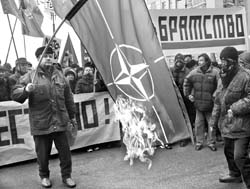Campaign Victims
Stereotypes about NATO on the rise
Ukrainians want their country to join the European Union but are opposed to NATO membership. These are the results of a poll conducted in Ukraine by the Democratic Initiatives Foundation and Kyiv’s Institute for Social Studies during February 4-15. This was the mood of Ukrainian society when the Ukrainian leaders arrived in Brussels to break through NATO’s silence. Even though the breakthrough appeared to be more “partisan” than transparent and unequivocal, definite contours of Ukraine-NATO cooperation were outlined at the meeting, during which President Yushchenko said Ukraine is prepared to join the Membership Action Plan, most likely after 2006.
Respondents were asked whether they would vote for EU membership if a referendum were held next week. Forty-four percent replied in the affirmative, 28% were against it, and 28% were not sure or refused comment. A total of 2,040 individuals were polled. When asked the same question about NATO, 48% said “no” and 15% said “yes”; 36% were undecided or refused to comment. The results of the poll point to a definite decline in the number of people who support NATO integration. Frankly, Ukrainians do not seem enthusiastic about their country becoming a member of NATO, although polls over the past five years have shown that the number of supporters has reached 30%, depending on the background of events during which a poll was being conducted; the tone of information campaigns; and even the specific formulation of survey questions.
Yevhen Marchuk, leader of the Party of Freedom, said in an interview with Radio Liberty that such information measures have a noticeable effect on public opinion: “I was the secretary of the National Security and Defense Council two years ago and we enlisted eleven sociological organizations to do polling. At the time we were developing a new 2002 Ukraine-NATO strategy. Such decision making requires a more or less realistic view of the situation. As it was, about 25-30% of Ukrainian citizens showed a tolerant attitude to the NATO integration idea simply because adequate information efforts had been made.” But then the US military operations in Iraq seriously undermined ordinary Ukrainians’ confidence in NATO; many in Ukraine regarded the whole business as “a war unleashed by NATO.” Half a year later, the Tuzla crisis served to partially justify the alliance in the eyes of the Ukrainian public.
Most experts attribute the current, nearly twofold, decline in public support for Ukraine’s membership in NATO to the anti-West hysteria that was unleashed during the presidential campaign. This situation demonstrates the consequences that can stem from the activities of foreign spin doctors who operate on another country’s home turf. “Unlike economic factors, foreign political orientations and moods among the population are more susceptible to situational, one-time upsurges or declines because most people lack stable views on foreign political issues, particularly NATO,” explains Iryna Bekeshkina, a sociologist. Most of her colleagues explain the overall decline in pro-NATO moods in Ukraine by the lack of information on the alliance in this country, including NATO specifics, objectives, and functions, as well as by surviving Soviet propaganda and Cold War stereotypes. This is evidenced by the unrealistic arguments that are presented by all those who oppose Ukraine’s Euro-Atlantic integration, as well as by the traditionally large number of undecided respondents (usually no fewer than 25%).
Polls conducted by Democratic Initiatives and SOCIS in late 2003 indicate that opponents of Ukraine’s NATO membership mostly explain their stand by pointing to the possibility that Ukraine will become embroiled in hostilities; that Ukraine can’t afford NATO membership at this stage anyway, and that, if and when, Ukraine would be dominated by “foreigners” and “foreign capital,” which would damage Ukrainian-Russian relations. The fiercest opponents of Ukraine’s membership in NATO are representatives of the older generation (aged 55 and over), and residents of the Crimea, and eastern and southwestern Ukraine.
The situation can still be corrected. Numerous information campaigns in Ukraine demonstrate that public opinion is a rather pliable substance and that a promotional campaign, especially if it isn’t destructive, untruthful, or hysterical, can produce results. Ihor Hryniv, director of the National Institute of Strategic Studies, said in a recent interview with Radio Liberty that “if the state adopts a clear stand, including in the educational sphere, and explains NATO to the masses and why we want to get there, and if the existing stereotypes are gradually replaced, then there will be no resistance whatsoever from the social moods in the long run.” In other words, the new government is faced with a choice: it can continue to issue ambiguous statements concerning Ukraine’s NATO membership, lagging behind all those mass consciousness superstitions, or it can make the best possible use of the new foreign political opportunities, which experts regard as “exceptionally favorable.” In the latter case, educational campaigns and professional discussions could turn the population into an ally on the road to integration into an effective system of collective defense and security — something our European neighbors, our former colleagues from the socialist camp realized a long time ago.






